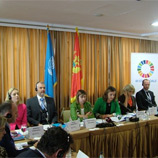 19 September 2016 - Practitioners from South Eastern Europe and international experts gathered in Budva, Montenegro, at a UNODC-organized Criminal Asset Identification Conference held on 19 and 20 September. Participants at the meeting are sharing and starting the implementation of best practices in identifying assets acquired through criminal enterprise. Identifying these assets is a critical first step in the process to deprive criminals of their ill-gotten assets.
19 September 2016 - Practitioners from South Eastern Europe and international experts gathered in Budva, Montenegro, at a UNODC-organized Criminal Asset Identification Conference held on 19 and 20 September. Participants at the meeting are sharing and starting the implementation of best practices in identifying assets acquired through criminal enterprise. Identifying these assets is a critical first step in the process to deprive criminals of their ill-gotten assets.
In recent years, this process has been made significantly more difficult as criminals have been taking measures to conceal their assets from authorities. A number of reports suggest they have increasingly started utilizing multiple jurisdictions to hide their dirty money, employing financial gatekeepers to act as intermediaries and exploiting secrecy vehicles to blur beneficial ownership of the assets. Only once all the practitioners get together and start employing their cutting edge toolkit to pierce through the veils put up by these criminals around their assets, can Member States begin the process of asset repatriation.
In a message delivered to the Conference, UNODC Executive Director, Yury Fedotov, said, "Money laundering is a global business that touches every country, and is worth billions of dollars to the criminal organizations." These words reinforce the importance UNODC has put on tackling organized crime through confiscating the benefit that crime provides. This Conference sets an example of UNODC's on-going support to all Member States in the region in building capacity to identify and recover criminal assets. Mr. Fedotov also encouraged all countries in the region to work jointly to curb the threat that organized crime represents.
Representing the Government of Montenegro was Tanja Ostojic, Acting Director General of the Directorate for International Cooperation of the Ministry of Interior of Montenegro and Chief of the Working Group for negotiations of Chapter 24 of the EU acquis which is focused on justice, freedom and security. Ms. Ostojic noted in her opening remarks that her country has made significant progress in the rule of law and that, while on its path towards full membership in the European Union, Montenegro and other jurisdictions in the region have designed ambitious, but realistic activities in their priority areas. Ms. Ostojic particularly emphasized the energetic commitment of countries in the region to implement obligations of the action plans for negotiating Chapters 23 and 24 of the EU acquis.
For her part, the United Nations Resident Coordinator in Montenegro, Fiona McCluney, told delegates about the challenge posed by organized crime to sustainable development , as it distorts economies and erodes confidence in government institutions. Additionally, Ms. McCluney identified the way forward in combatting organized criminal activities, declaring that "cutting criminals off from their illicitly gained wealth is key to destroying the incentive to commit a crime, thus building a society where equal opportunities exist for all to participate in sustainable development."
At the event, which is part of the activities under UNODC's South Eastern Europe Regional Programme, practitioners from South Eastern Europe were able to interact with a number of global experts in the field attending the conference in order to share information and build a basis for potential joint investigations. The training methods and working relationships fostered through the conference can assist countries in South-Eastern Europe to build a sustainable and effective network of experts who tackle the challenge organized crime presents to the region.